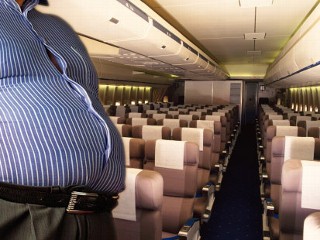
United Airlines has started double-charging 'oversized' flyers in Chicago. They aren't the first. Dallas-based Southwest airlines adopted the practice in 2004. It seems that the heavier weight of American passengers is hurting airlines' bottom-line due to higher fuel consumption. A study conducted in 2000 by the Center for Disease Control and Prevention quantified these losses by concluding that heavier waistlines forced the industry to spend $275 million to burn 350 million more gallons of fuel. This caused an extra 3.8 million tons of carbon dioxide to be released into the air (look out for the environmentalists!)
Now I understand that being obese may force you to take up two seats in an airplane and I see the airlines point of view on the issue - heavier waistlines cost them money. I'm not so big on the environmental concerns because there are much more ethically simple means to reduce carbon emissions than to start targeting overweight people. However, I can't help but wonder about the economic ramifications of the double-charging policy if it was to become standard practice within the American aviation industry.
Let's think about it for a second. Assume this becomes an established business practice and a consensus is reached within the airline about what constitutes an 'oversized customer'.
Now take into consideration the following data:
Obesity (BMI > 30) and Severe Obesity (BMI > 40) Among U.S. Adults. | |||
(BMI > 25) | (BMI > 30) | (BMI > 40) | |
| Source: CDC, National Center for Health Statistics, National Health and Nutrition Examination Survey. Health, United States, 2002. Flegal et. al. JAMA. 2002;288:1723-7. NIH, National Heart, Lung, and Blood Institute, Clinical Guidelines on the Identification, Evaluation and Treatment of Overweight and Obesity in Adults, 1998. | |||
and...

As you can see, the majority of American adults are considered overweight or obese. Now, let's only consider the 'Obese' category - 30.5% of American adults as of the year 2000.
So, charging over 30% of the American population an indirect 'obesity tax' could have some interesting economic ramifications. Either these flyers reduce their demand for flying by substituting airplanes for alternative transportation mechanisms such as trains, buses or cars when possible. Or they start to feel the squeeze on their wallets and make lifestyle changes, including less consumption of fast and junk food - which would hurt McDonalds and friends. Or, and that's always a possibility, overweight Americans decide to keep flying and continue satisfying their Big Mac cravings which would end up making everyone happy except the environmentalists.
Just some food for thought...(pun intended)
No comments:
Post a Comment